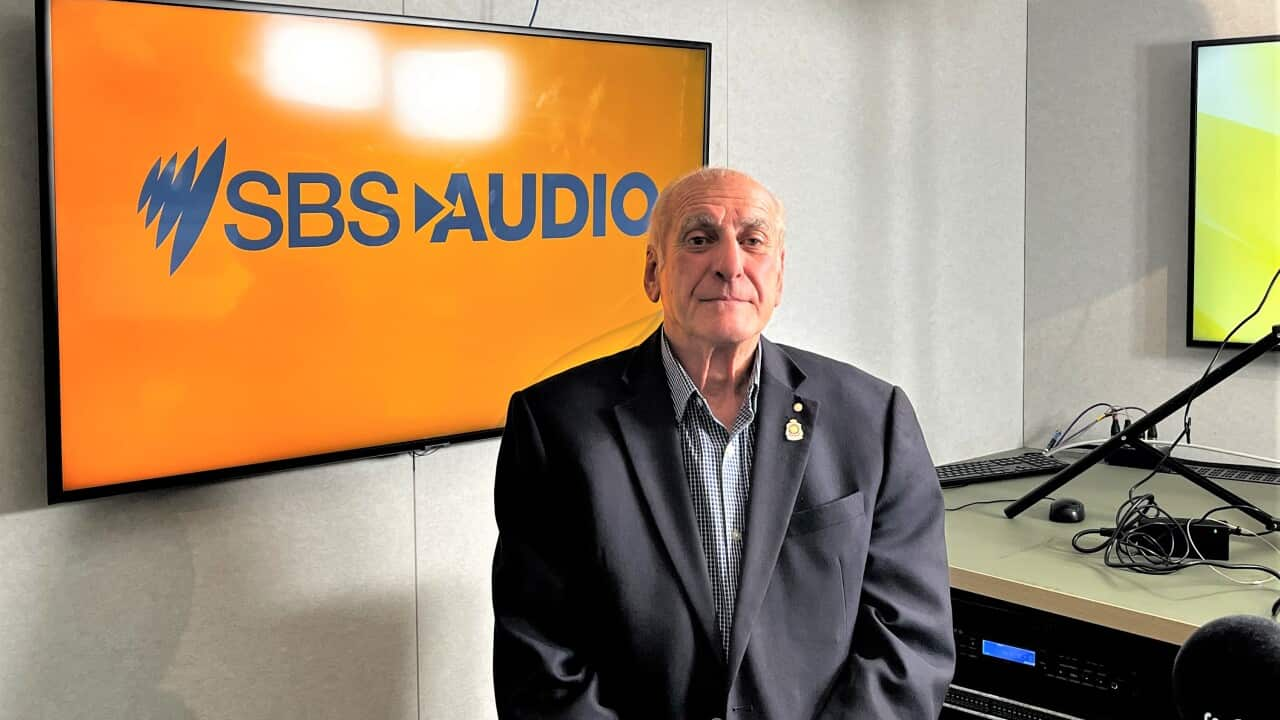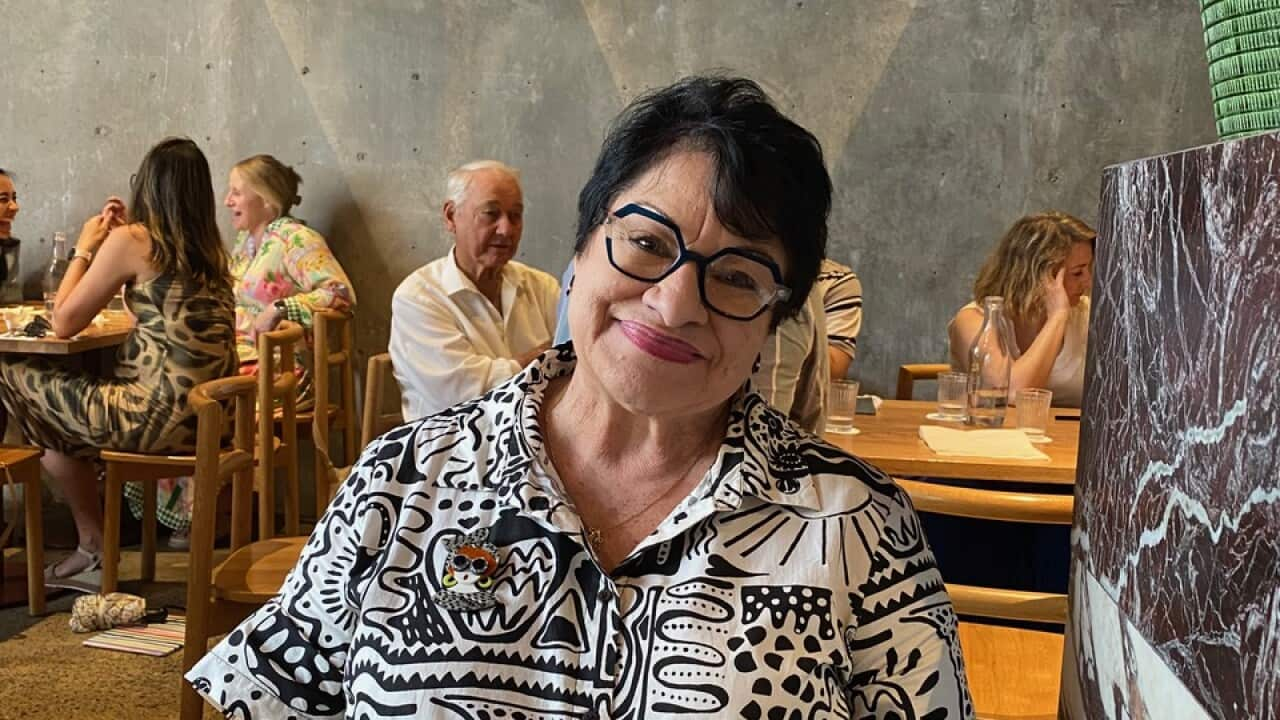George Kanarakis delivered countless lectures and talks at festivals and events organised by community institutions. He was always gracious, approachable, and willing to respond to every invitation extended to him. The same was true for the Greek Program of SBS Radio, where he was a frequent guest.
Personal Testimony
I first met him in 1990, and beyond our professional collaboration, a strong personal friendship developed. Whenever he travelled from Bathurst, where he lived and taught (at Charles Sturt University), to Sydney, he always made time for us to meet, often at the ever-hospitable home of the late colleague Grigoris Chronopoulos.
I also had the honour of introducing and presenting George Kanarakis at various talks he gave as part of the Greek Festival of Sydney, the Cultural Committee of the Cyprus Community of NSW, the Greek-Orthodox Parish–Community of St Nectarios Burwood and District, and other community organisations.
We also participated together at the founding congress of the –now defunct– Federation of Greek-speaking media overseas, (ΟΛΟΜΜΕ) in Thessaloniki in the late 1990s. In addition, George Kanarakis was the keynote speaker at the Symposium organised in Sydney by the –also no longer active– Association of Greek Media of Oceania (ΕΛΟΜΜΕ Oceania).
Our last conversation was a few months ago, over the phone, when I once again sought an interview with him. With characteristic politeness, he explained the health struggles he was going through and told me that, unfortunately, this time he could not participate. It was the only time in 35 years that he was compelled to say no. And yet he spoke as if he felt guilty for it. Whereas in truth, all the honour and gratitude ought rightfully to come from me to him, as he was the one who supported me from my earliest steps in journalism.
His major achievements
Among the great achievements of George Kanarakis were his monumental study and presentation of Greek-Australian literature (awarded by the Academy of Athens), as well as his works on the history of the Greek-language press in Australia and New Zealand.
George Kanarakis was born on 12 January 1936 in Piraeus, and he would always declare with a characteristic smile and tone that he was a “proud Piraeus native.”
As mentioned, last night, I spoke with the family of the late Professor. They told me that it was his wish to be laid to rest in Bathurst. The funeral service will be held at the Anglican Cathedral there, since there is no Greek Orthodox church. The family is making arrangements for a Greek Orthodox priest to travel to Bathurst. Once this has been finalised, the date of the funeral will be announced.
From this platform we extend to his wife Marcia, their children Evangelos and Fotini, and to the entire family, our sincere condolences and our heartfelt wish for comfort from above.
Please note: the audio provided here is in Greek.
The following CV, was forwarded by his family:
Dr George Kanarakis OAM is Emeritus Professor of Linguistics, Charles Sturt University,He studied philology (Greek and English) at the National and Kapodistrian University of Athens under a Hellenic State Foundation Scholarship, English (TEFL) with the British Council in London, and Linguistics under a Fulbright Scholarship at Michigan State University and Indiana University, USA.
In 1968 he received his MA in Applied Linguistics from Indiana University and in 1974 his PhD (Honors) in Contrastive Linguistics from the Faculty of Philology, University of Athens which awarded him a Saripolos Grant for the publication of his PhD thesis in the “Sophia N. Saripolos Library Series, No. 24”. Additionally, he has received scholarships and grants from Indiana University, the Australian Research Council, the Australia Council Literature Board, the Commonwealth Schools Commission and other national authorities.
He has taught at the University of Athens English Department (1966-1976) including several years as its Coordinator, Deree-Pierce College (now The American College of Greece), Athens, the University of La Verne, as visiting professor at Bridgewater State College, USA, and elsewhere. Since 1976 he taught at Mitchell Cοllege of Advanced Education, now Charles Sturt University, Australia. He lectured at the Australian College for Seniors (1982-1996), the School for Talented Children (1985-1989) and the Charles Darwin University Hellenic Studies summer program (2007-2009).
Professor Kanarakis’ scholarly research and interests extend to Greek and English languages and linguistics, the literature and history of the Greeks of the diaspora and the Greek press in Australia and New Zealand.
He has published books and monographs as well as articles in international journals in Australia, Greece, Cyprus, the USA, Canada, Germany and Chile in Greek and in English, as well as in Spanish, Portuguese and Polish translations.
Considered pioneering are his works The Literary Presence of the Greeks in Australia (1985, in Greek), Greek Voices in Australia: A Tradition of Prose, Poetry and Drama (Australian National University Press, 1987, 1991), In the Wake of Odysseus: Portraits of Greek Settlers in Australia (RMIT University Press, 1997), The Greek Press in the Antipodes: Australia and New Zealand (2000, in Greek), The Diachronic Contribution of Greek to Other Languages (2014, 2015, in Greek) and The Legacy of the Greek Language (2017). The first and the fourth were awarded prizes by the Hellenic Society of Letters (Athens, 1991 and 2000), and the second by the Australian Bicentennial Authority (1987). His book The Phonological Interference of Modern Greek in Writing English (1974, in Greek) was included in the Saripolos Library Series by the University of Athens and George Nicolaides: A Cypriot Page in Australian Hellenism (2003) was published by the Presidential Commissioner’s Office, Nicosia, Cyprus.
Professor Kanarakis was elected a corresponding member of the International Academy for the Promulgation of Civilization, Rome (1994) and he was appointed as a consultative member of the international society Greek Civilization and Europe, based in Germany (1998). Among other awards, and the Olympiad of Letters Award (Greece, 2004). He was honored by Euroclassica and the Academia Homerica (Greece, 2005), by the University of Athens at Delphi (Pythia 2008) “for having upheld the Hellenic values throughout his life and work”, with the Gold Medal of Alexander the Great (2011) by the International Organization for the Promotion of the Arts, with the UNESCO Medal (Piraeus and Islands, 2011), with the International Pan-Arcadian Confederation Medal (Greece, 2014), with the Gregory Xenopoulos Medal (2015) by the Society of Hellenic Writers (Greece), and with the Hypatia Prize (2018) by the Australian-Hellenic organisation AHEPA of New South Wales. In 2019 his lifelong work was acknowledged in a one-day conference as part of the “Athens, World Book Capital” activities (Greece) under the aegis of UNESCO.




